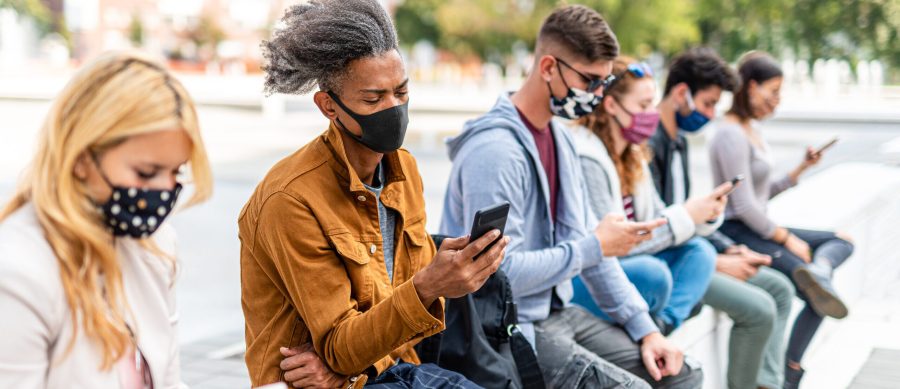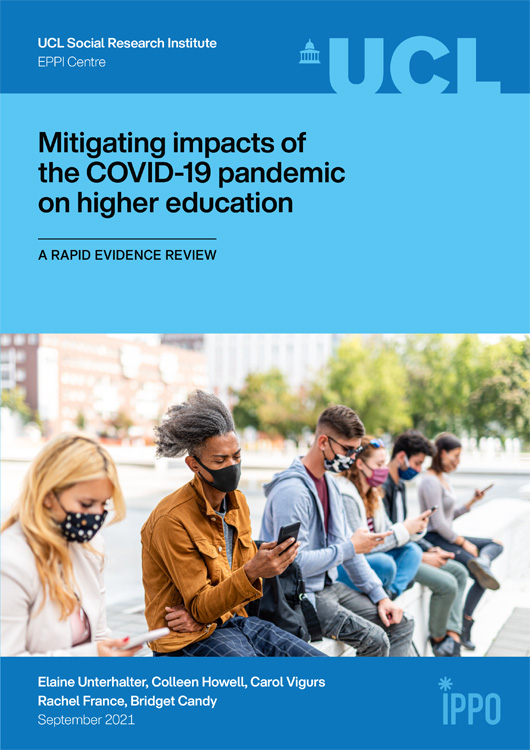The UK’s Higher Education community cannot forget the disruptions of the past two years – but this review offers global evidence of positive paths out of the crisis

The co-author of IPPO’s Rapid Evidence Review on Higher Education harms and mitigations during COVID-19 offers her reflections on the lessons learned and some potential ways forward for the sector, staff and students. Read the full review here
Elaine Unterhalter

The first weeks of September always have an air of expectation about them, with new school and university terms beginning. As the first conkers appear on trees in the park, my inclination is to focus on something new. This September I want the autumn mists to help me forget the disruptions and distresses of the last two academic years – and part of me wants the University I work in to do the same.
However, the Rapid Evidence Review I have just completed with my UCL Institute of Education colleague Dr Colleen Howell on the impact of the COVID-19 pandemic on the UK Higher Education sector and its students reminds me this cannot be the case.
Our review – published today by the International Public Policy Observatory (IPPO) following a commission by the Department for Education (DfE) – pulls together evidence from 38 studies relating to UK universities during the pandemic. These highlight multiple and interlinked pressures on widening participation strategies, student financial hardship, stress and anxiety for students and staff, uneven or truncated learning experiences, and difficulties for management in planning in both the short and medium terms.
The most troubling conclusion from our review is that the financial and emotional hardships reported, and the disruptions to professional training, were not episodes that can be easily sorted. Rather, they have marked (and marred) the experience of Higher Education for students and staff alike in ways that will have lasting effects for years to come. In this sense, our findings are a bitter harvest.
New-term hopefulness
However, we also looked for evidence relating to mitigations of these harms from 39 systematic reviews and 24 research studies of Higher Education institutions’ responses to other disasters and pandemics. This strand of our review drew on work from the UK, US, New Zealand, South Africa, Malaysia, Japan and Italy – and these studies (which also document what kind of outcomes have emerged) offer suggestions which give some sense of new-term hopefulness.
In particular, they highlight the need for policymakers and practitioners to focus Higher Education institutions much more deliberately on student and staff wellbeing, steering them towards inclusive strategies for learning, teaching, research cultures and community engagement.
Meaningful inclusive strategies require understanding of the full meaning of ‘exclusion’ from the Higher Education system. For example, when the financial costs of studying or working are steep, additional funds may be required to target student wellbeing that are simple to access. But exclusion is also linked with ways in which ideas or practices may be difficult to access, or when relationships are hostile, bullying or lack empathy.
Our research on mitigations highlights the importance of providing easily accessible, short-term interventions for mental health problems for students and staff, in addition to well-resourced student wellbeing services and adequate support for staff engaged with this work. The stresses of the pandemic have touched staff, students, their families and friends, and the need for these services in the coming year is considerable. Successful planning to meet this demand has been shown to have positive effects on student learning as well as student/staff wellbeing.
Paths to tackling inequality
Our Rapid Evidence Review charts potential paths to tackling some of the staggering inequalities in UK society. One strand is improving strategies for widening participation in Higher Education, making these much more targeted and specific with regard to helping disadvantaged students – beyond simply motivating them to apply.
We also highlight a broad consensus among studies by economists that supporting students on low incomes through schemes that pay both university fees and living expenses are key when seeking to ensure these students finish their studies. This autumn, we expect to hear further responses to the recommendations of the Augar Review on funding Further and Higher Education in England. Our research indicates how this needs to consider students whose economic situation has worsened through the pandemic.
Furthermore, the studies reviewed highlight the importance not only of helping students into work when they graduate, but of staying in touch with them through, for example, their first experiences as doctors, teachers, nurses or community workers.
The importance of planning
Strikingly, a number of studies of Higher Education during and after pandemics and environmental disasters spoke about the need for management not to pretend that nothing had happened. Very productive outcomes were noted when staff and students have been given space in the curriculum to reflect on what happened through a pandemic or a disaster and make sense of it through their particular discipline, using a range of learning approaches.
Crisis planning is documented as a key element in this process: one way in which the stress of the pandemic ratcheted up for those working in Higher Education is linked to a lack of planning. In virtually every area of university work, decisions made one way had to rapidly change, sometimes multiple times. The evidence suggests that if staff have some knowledge of, and involvement in, establishing the broad outlines of plans regarding what to do before, during, and after a disaster, they may be less bewildered by this process, understanding how the short-term contingencies of action fit into the bigger picture of strategy response.
Every disaster will have its own contours, of course, but the literature on disaster risk management notes that these can be mitigated to some degree if there are plans in place – not just for HE institutions, but for all the different people who work in them, and for the relationships between universities and the societies they serve.
A better place next time?
In conclusion, our review of research on mitigating the effects of pandemics and other disasters on Higher Education highlights how connected this sector is to other phases of education, to the societies in which they are located, and to the histories they live through.
A recent interview with Dr Teresa Lambe caught my eye. An Associate Professor of Immunology and Vaccinology at the University of Oxford, she is part of the team that developed the Oxford/AstraZeneca vaccine. The pandemic had brought her some particularly intense experiences of work stress and pressure – but interestingly, she was not triumphalist despite the huge achievement of developing the vaccine.
‘We and others have sacrificed so much during this pandemic,’ Dr Lambe said. ‘I don’t want the next generation to have to do that.’ She added that it is only a matter of time until the next pandemic: ‘We need to put processes in place so we’re in a better place next time.’
Our IPPO Rapid Evidence Review gives concrete examples of steps to take around student finance, mental health provision, and deepening relationships with the communities that Higher Education connects with – in order to help build this better place.
Elaine Unterhalter is Professor of Education and International Development at the Institute of Education, University College London
- To read all four IPPO Rapid Evidence Reviews in full, click here
